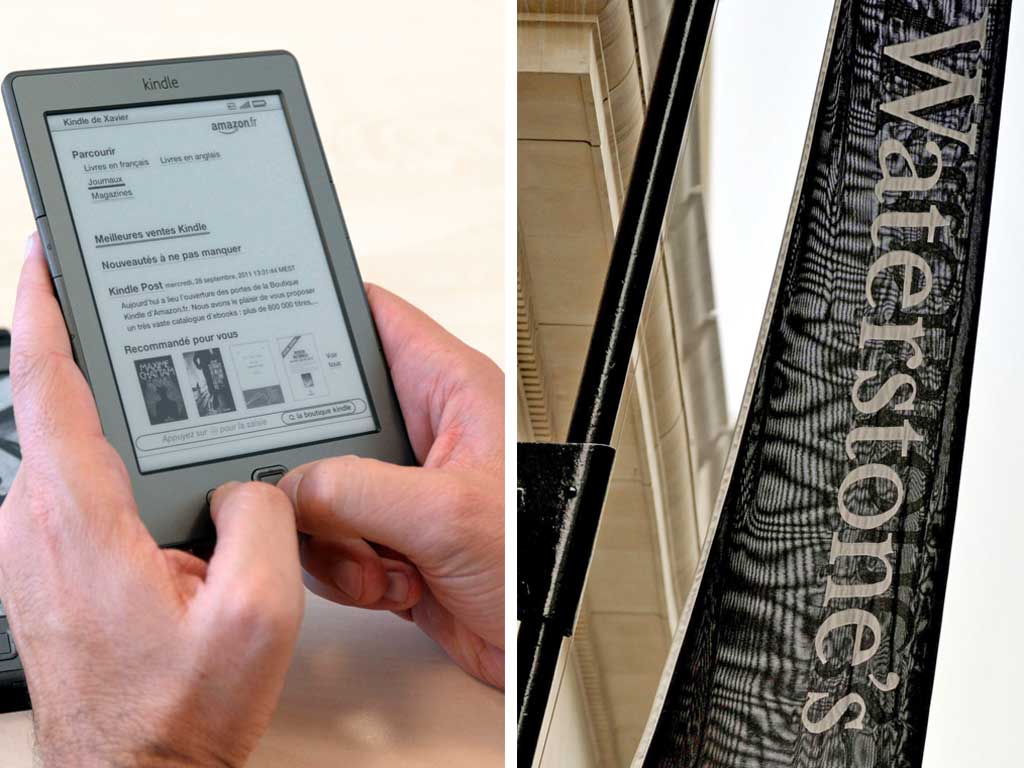Trending: Hardbacks vs e-books: the sequel
Does the announcement that Waterstones is to sell Amazon's Kindle mean that bookshops are giving up, asks John Walsh

Your support helps us to tell the story
From reproductive rights to climate change to Big Tech, The Independent is on the ground when the story is developing. Whether it's investigating the financials of Elon Musk's pro-Trump PAC or producing our latest documentary, 'The A Word', which shines a light on the American women fighting for reproductive rights, we know how important it is to parse out the facts from the messaging.
At such a critical moment in US history, we need reporters on the ground. Your donation allows us to keep sending journalists to speak to both sides of the story.
The Independent is trusted by Americans across the entire political spectrum. And unlike many other quality news outlets, we choose not to lock Americans out of our reporting and analysis with paywalls. We believe quality journalism should be available to everyone, paid for by those who can afford it.
Your support makes all the difference.In the world of journalism it's called a "reverse ferret" – a story breathlessly announcing that Black is White, just 24 hours after confidently asserting that Black is Black. In the genteel environs of publishing, it's a volte-face. Whatever it is, James Daunt, owner of Daunt Books and managing director of the Waterstones chain, executed a classic twirl at the weekend.
On Sunday, he talked to The Observer's Robert McCrum about the current fortunes of publishing. What, McCrum asked, should a modern British bookseller do about the digital behemoths of Amazon, Apple, Google and Microsoft? The answer, Daunt said, is to "insinuate ourselves into the [digital] process", by persuading Waterstones customers to choose an e-reader sponsored by the company, and buy e-books to read on it. "We'll be different from Amazon," he said darkly, "and we'll be better."
What a difference a day makes. Yesterday morning, to general consternation, Daunt announced that Waterstones would henceforth be selling Kindles, and its various "digital services" (i.e. e-books) in all its shops. "Our customers want to read digitally," Daunt said, and the new partnership with Amazon "will provide a dramatically better digital-reading experience" – whatever that might be.
Concerned viewers noted that Daunt seemed decidedly pink and damp around the eyes, as if the news had stirred mixed emotions in him. This will not surprise Independent readers who learnt, in an interview with me last December, his passionate view of the company that has become his new partner. Amazon, he said, "never struck me as being a sort of business in the consumer's interest. They're a ruthless, money-making devil." His strategy, he said, was to beat it at its own game: "You'll walk into a Waterstones," he promised, "and there'll be a bit of the shop where you can look at e-readers, play with them. We're inventing one of our own – perhaps we'll call it the Windle." This idea was borrowed from Barnes & Noble, the upmarket US bookshop chain, which invented the "Nook" and flogged it in its bookshops, blithely taking market share away from the all-conquering Amazon.
Daunt was brought into Britain's largest bookselling company last year as a swashbuckler, a man to halt the bookshop's slide in choice and revenues. He was welcomed as a combination of Indiana Jones and Red Adair, the Texan fixer of rogue oil wells. The reaction to his bombshell has been crushing disappointment. "It's a sad day for British publishing," says Jamie Byng, boss of Canongate, the independent publishers, "because it hands over to Amazon the whole of the digital market that Waterstones might have had. It eliminates the possibility everyone was hoping for, that they could develop their own proprietorial piece of hardware, like the Nook, the Kindle, the iPad.
"Everyone was encouraged by Barnes & Noble using their physical bookstores in tandem with their own e-book device – leveraging their own brand into the digital arena. It was the great white hope for British publishing that it might happen here. This news means that it won't."
Daunt insists that his decision doesn't mean he's "forsaking" the kind of book that has pages, cloth binding and a jacket. He assures shoppers that "digital is very much an adjunct to reading physical books – we realise that in some circumstances an e-reader is more convenient". Undoubtedly he has had to find some credible strategy to offer e-books to his customers. And time and money clearly worked against the introduction of the Windle. (According to Jamie Byng, the company should have been developing the idea back in 2009, when the Nook and Kindle were first presented to thunderstruck readers on Fifth Avenue.) But it's still a matter of wide regret to see the digital future of British publishing handed over to a Godzilla-sized monster which would like nothing better than to put it out of business – or keep it simply as a colourful showcase of goods behind its cyberspatial-sales monopoly.
Join our commenting forum
Join thought-provoking conversations, follow other Independent readers and see their replies
Comments